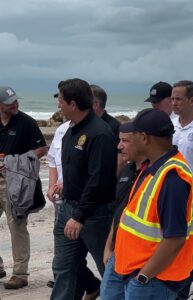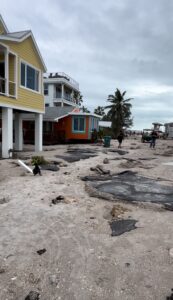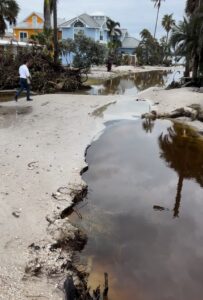The first of our three-part series looks at how the state government frames the tough choices of flooded property owners.
By Mark Warriner
Original Air Date: October 30, 2024
Host: In the wake of three storms and historic flooding this hurricane season, hundreds of property owners on barrier islands and on the coastline in Sarasota-Manatee are facing tough choices about the reconstruction of their damaged buildings. This will prompt state and local policy makers into action as far as long-term reconstruction plans. But many questions remain about how — and even whether — to rebuild, and WSLR News reporter Mark Warriner is trying to find answers. This is the first of three reports.
Mark Warriner: In a series of press conferences, Governor Ron DeSantis responded to the hurricanes that pounded the Gulf Coast of Florida recently. With the backdrop of major coastal devastation, DeSantis began giving us an idea of his vision of the long reconstruction that lay ahead. There was one thing he made clear: it would not include referencing climate change. During a recent visit to storm-wrecked Sarasota, he responded to a reporter’s question.
Johannes Werner: Johannes Werner, WSLR News. When will we hear the words climate change from you?
Ron DeSantis: The chance of me virtue signaling for people in the media is zero. So do not count on that—
[applause]
RD: — tired of this song and dance. I get you have an agenda. I understand that. I think you should be more honest about what that would mean for people: taxing them to smithereens, stopping oil and gas, making people pay dramatically more for energy. We would collapse as a country. So this whole idea of climate ideology driving policy, it just factually can’t work. And so in Florida, our energy is going to be

Ron DeSantis, touring devastated Anna Maria after Helene. Photo: Warriner
affordable and reliable. That’s what you’re going to do. That’s the only way you can adequately respond to things like we just saw with the storms that get people hooked back up.
MW: In a previous press conference in St. Petersburg just after hurricane Milton, DeSantis responded to a question about whether people should be allowed to live on Florida’s barrier Islands or not.
RD: People have their property. They have a right to do with what they want to do with it. And it is tough when you have two back to back storms. No question. What I see is people have a lot of resilience. I know there’s people who are interested in — and when we had Hurricane Ian, that probably was the most significant storm that we’ve had. I mean, Michael was stronger, but Ian was so big. I think the total damage was probably more on that. And a lot of people were saying, “Oh, you know, are people going to want to live in Southwest Florida?” And within two weeks, you had people buying up homes. I mean, people wanted to get down there.
So I think that there’s always going to be a demand to live in a beautiful part of the world. The reality is people work their whole lives to be able to live in environments that are really, really nice, and they have the right to make those decisions with their property as they see fit. It is not the role of government to forbid them or to force them to dispose or utilize their property in a way that they do not think is best for that.
MW: While the term “climate change” is off the table, the word “resilience” is part of the governor’s basic vocabulary. After Hurricane Helene, in an interview on Anna Maria Island, Jared Perdue, the head of Florida’s Department of Transportation, responded to my question whether roads along Florida’s coastline will be upgraded in light of the recent destruction by the storms.
MW: Well, this was a record storm surge, so I’m wondering if you’re going to elevate the road or anything like that.

Anna Maria after Helene. Photos: Warriner
Jared Perdue: We build resiliency into every new project that we do. We have a lot of different tools in our toolbox, and one of those is coastal hardening and protecting the road from that type of storm surge. This is something that we have been doing for many, many years, and we build that into all of our projects.
MW: By far, most experts argue global warming is a fact established by scientific research. Robert Bunting is a meteorologist, entrepreneur, educator and CEO of the Sarasota-based Climate Adaptation Center. He said this about global warming.
Bob Bunting: We’ve got a warmer Gulf of Mexico and warmer seas and a warmer atmosphere than we’ve had in all of human history. So that’s a measurement. That’s not a prediction. There’s nothing political about it; It’s just what it is. And the heat that we have in the ocean is an excess of rocket fuel for hurricanes. So those warmer climate induced sea surface temperatures are resulting in more intense hurricanes. Now you can say nothing has changed, and you can say we always had hurricanes, but we’ve never had this many severe hurricanes, and that’s a fact.
MW: On Thursday and Friday of this week the Climate Adaptation Center will be holding a conference called Climate and Human Health on the USF campus in Sarasota.
Not only do scientists believe we should adapt to global warming, so does the insurance industry. WSLR talked with Jeff Brandes, former Republican state senator and currently President of the Florida Policy Project.

Jeff Brandes: We can’t be paying flood insurance claims year after year after year, right? That’s not sustainable, right? You know, insurance is based on a loss every thirty, forty, fifty years; when you start paying for that loss every ten, or in some cases, every three or four, you’re not selling insurance anymore, that’s not actually sound. And if we were going to charge you actually sound rates on a $100,000 policy that floods every two years or every three years, we would be paying, you know, $30–40,000 a year in insurance which is not sustainable either.
So, we put ourselves in this kind of moral quandary here, where we have to do something; a lot of people aren’t going to like what has to be done. But the simple truth is, many of these homes as they stand today are uninsurable, and had the federal government not provided insurance, no private company would provide insurance if a home floods every three years in order to get a $2,000 premium or $3,000 premium to pay out $150,000. I certainly wouldn’t do that with my money and at that risk to insure somebody.
So we have to realize that, if your contention is correct, that we are kind of in this global climate change world, and that we’re going to see much more frequent flooding, then we have to adjust building codes and move to the higher flood plain. Or to compensate for that, it’s a lot of mitigation. We’re not going to stop climate change before the next storm hits. Right? If that’s correct, and so we have to mitigate where we can, and that’s going to require us to make some tough choices, and it’s going to require us to do some very difficult things. They’re going to have a huge financial impact on many people.
MW: In the next installments for this series on long-term hurricane reconstruction, we will explore the pros and cons as it relates to the local Florida barrier islands, our coastline and the flooding of newer communities built inland. I hope you join us in this important discussion about Florida’s future.
Reporting for WSLR News, this has been Mark Warriner.
WSLR News aims to keep the local community informed with our 1/2 hour local news show, quarterly newspaper and social media feeds. The local news broadcast airs on Wednesdays and Fridays at 6pm.